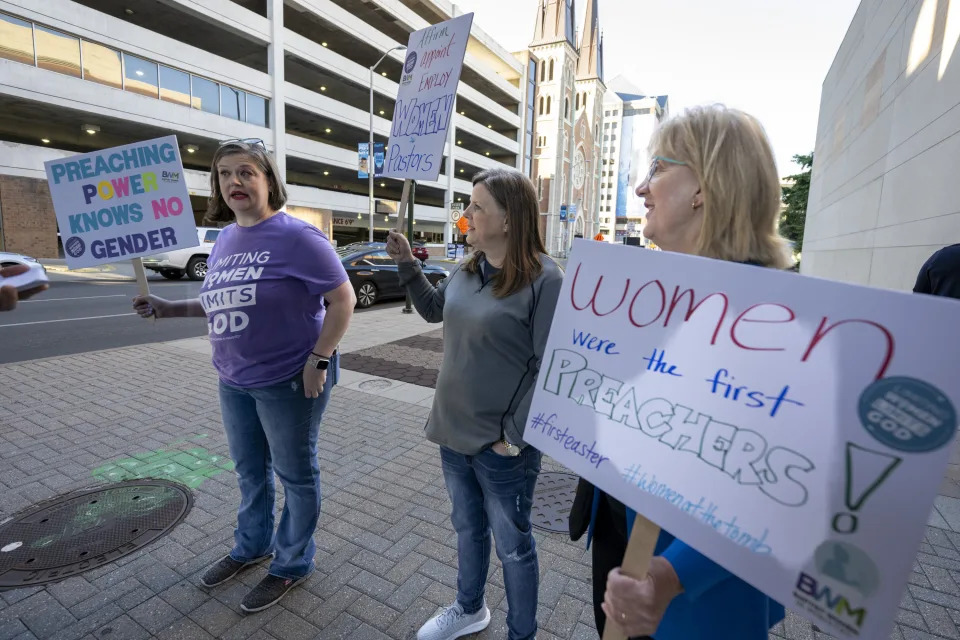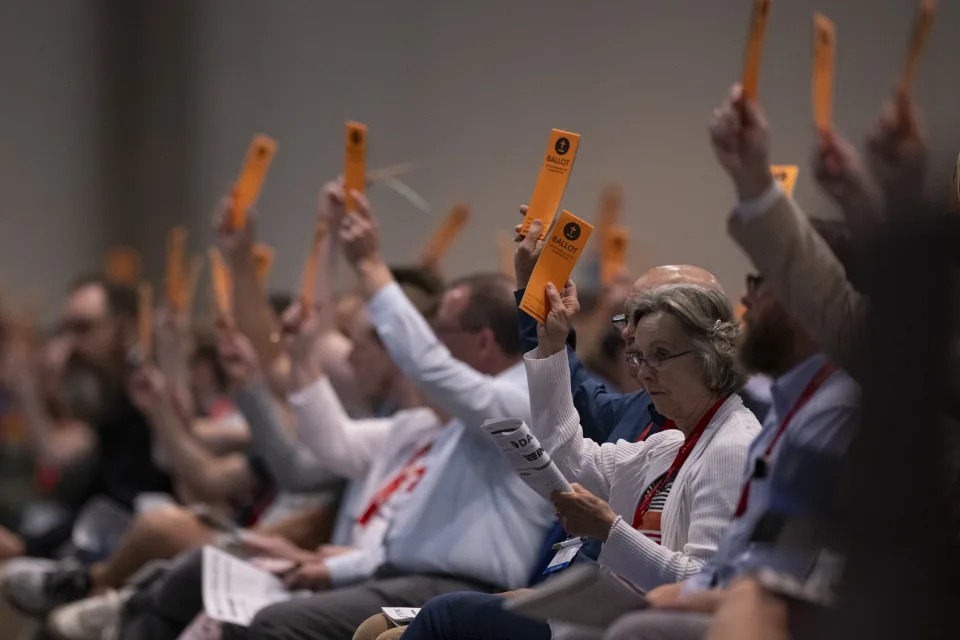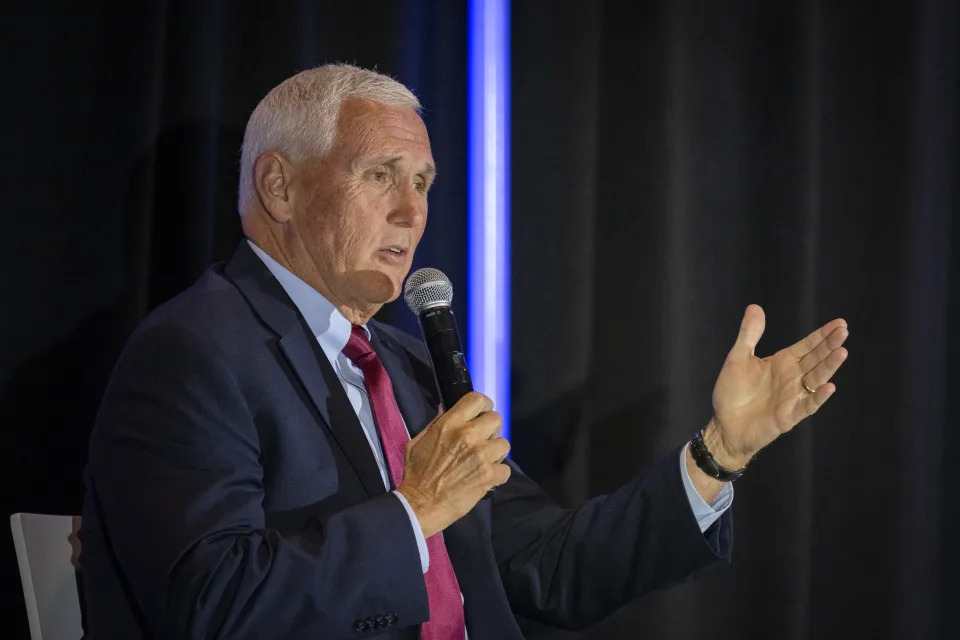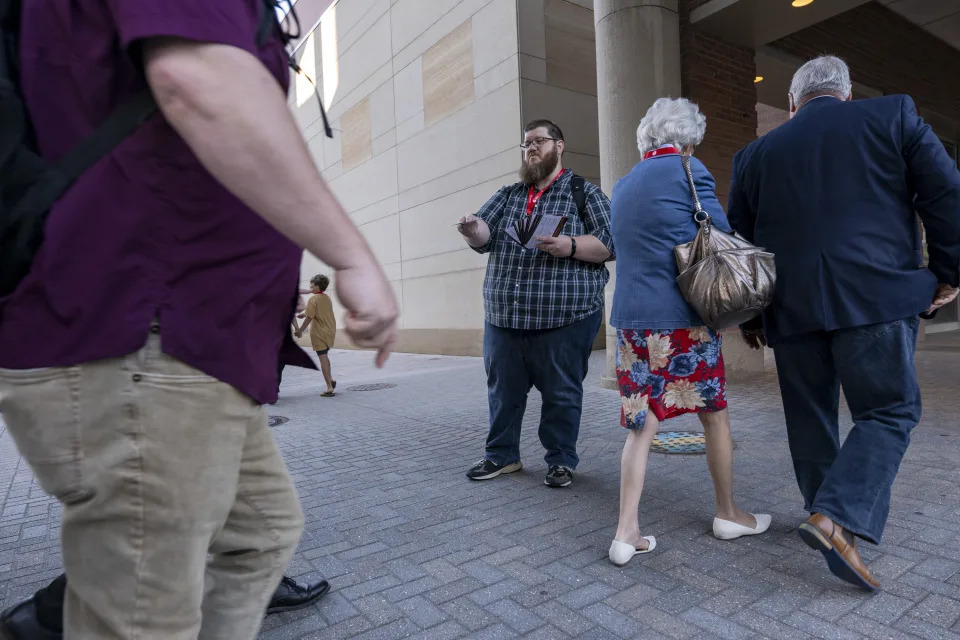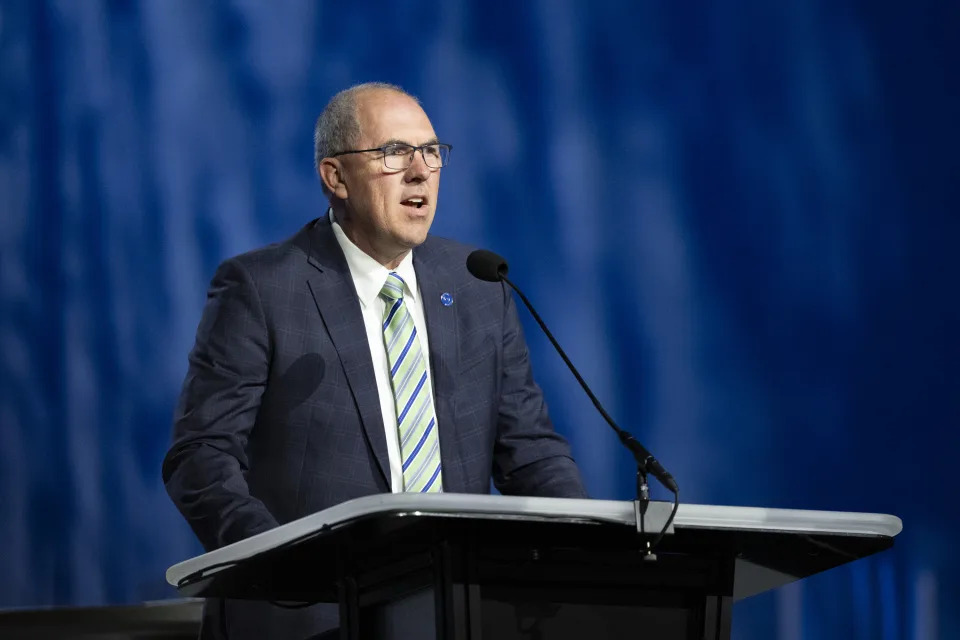Robert Tait in Washington
Tue, June 11, 2024

Samuel Alito and his wife Martha at the capitol in Washington DC
Samuel Alito, the US supreme justice at the center of a flag controversy that has called his impartiality into question, has said one side of the US’s bitter left v right ideological conflicts has to prevail, in secretly recorded remarks that are likely to exacerbate concerns about judicial neutrality.
In unguarded comments made to a film-maker posing as a conservative, Alito – one of the court’s most conservative justices – also agreed with the assertion that the US had to be “returned to a place of godliness”.
His wife, Martha-Ann Alito, was also recorded making critical comments about the gay pride flag.
The Alitos were recently revealed to have flown an upside-down US flag, symbolizing the “Stop the Steal” movement that attempted to overturn the results of the 2020 election in favor of Donald Trump, outside their home only weeks after the January 6 insurrection at the Capitol.
The couple shared their sentiments with Lauren Windsor, a liberal film-maker who attended the court’s Historical Society black-tie annual dinner this month, using her real name but posing as a Catholic conservative. She engaged Alito in a conversation about the prospects for a compromise resolution to America’s polarised political landscape.
Appearing to rule out such a compromise, Alito said: “One side or the other is going to win”, before adding:
“There can be a way of working, a way of living together peacefully, but it’s difficult, you know, because there are differences on fundamental things that really can’t be compromised.”
Windsor said: “People in this country who believe in God have got to keep fighting for that, to return our country to a place of godliness.”
The justice replied: “I agree with you. I agree with you.”
The exchange will further intensify the scrutiny on Alito after the flag controversy has called his impartiality into question, particularly after additional revelations that the Alitos flew another flag favoured by the January 6 protesters, bearing the slogan Appeal To Heaven, at their New Jersey holiday home.
The disclosures have sparked calls from Democrats for Alito to recuse himself from forthcoming supreme court rulings on the January 6 events.
The justice has declined to do so, saying it was his wife who chose to fly the flags outside his house, and claiming he had no say.
Martha-Ann Alito waded further into the flag controversy at the Historical Society dinner as well, criticising the flag being flown for Gay Pride month.
EXCLUSIVE UNDERCOVER AUDIO:
Martha-Ann Alito Unfurled
"I want a Sacred Heart of Jesus flag because I have to look across the lagoon at the Pride flag for the next month." pic.twitter.com/okNsW7SPlu— Lauren Windsor (@lawindsor) June 10, 2024
“You know what I want?” she said in Windsor’s recording. “I want a Sacred Heart of Jesus flag, because I have to look across the lagoon at the Pride flag for the next month.”
She then ruminated on other flags she might hoist to taunt her ideological adversaries – including one bearing the Italian word for shame.
“‘He’s like, ‘Oh, please don’t put up a flag,’” she said, in apparent reference to her husband. “I won’t do it because I am deferring to you. But when you are free of this nonsense, I’m putting it up and I’m gonna send them a message every day, maybe every week, I’ll be changing the flags.
“They’ll be all kinds. I made a flag in my head. This is how I satisfy myself. I made a flag. It’s white and has yellow and orange flames around it. And in the middle is the word ‘vergogna’. Vergogna in Italian means shame – vergogna. V-E-R-G-O-G-N-A. Vergogna.”
In a further and notably snide exchange that included critical comments about a female journalist, Martha-Ann Alito appeared to be won over by Windsor, agreeing it was impossible to negotiate with “the radical left” and expressing no objection to the journalist’s repeated expletives.
Windsor had less success in eliciting unmoderated opinions from the supreme court’s chief justice, John Roberts, who balked at her suggestion that the country’s polarised split was irreparable.
Pushed by Windsor on whether the court should have a role in leading the nation to a “more moral path”, Roberts said: “No, I think the role for the court is deciding the cases.”
Windsor’s tactics were criticised by the Historical Society. In a statement, the organisation’s president, James Duff, said: “We condemn the surreptitious recording of justices at the event, which is inconsistent with the entire spirit of the evening.”
She defended herself by saying the court’s lack of openness meant there was no other way. “They are shrouded in secrecy and we have seen them be willing to overturn long-standing precedent in ways that are really extraordinary,” Windsor told the Washington Post. “Americans are really at this crossroads of do we continue with a secular democracy or do we let a conservative majority take us down a path of Christian theocracy.”
Alito’s Wife Shocked Even the Activist Who Secretly Recorded Her
Ian Ward
Tue, June 11, 2024
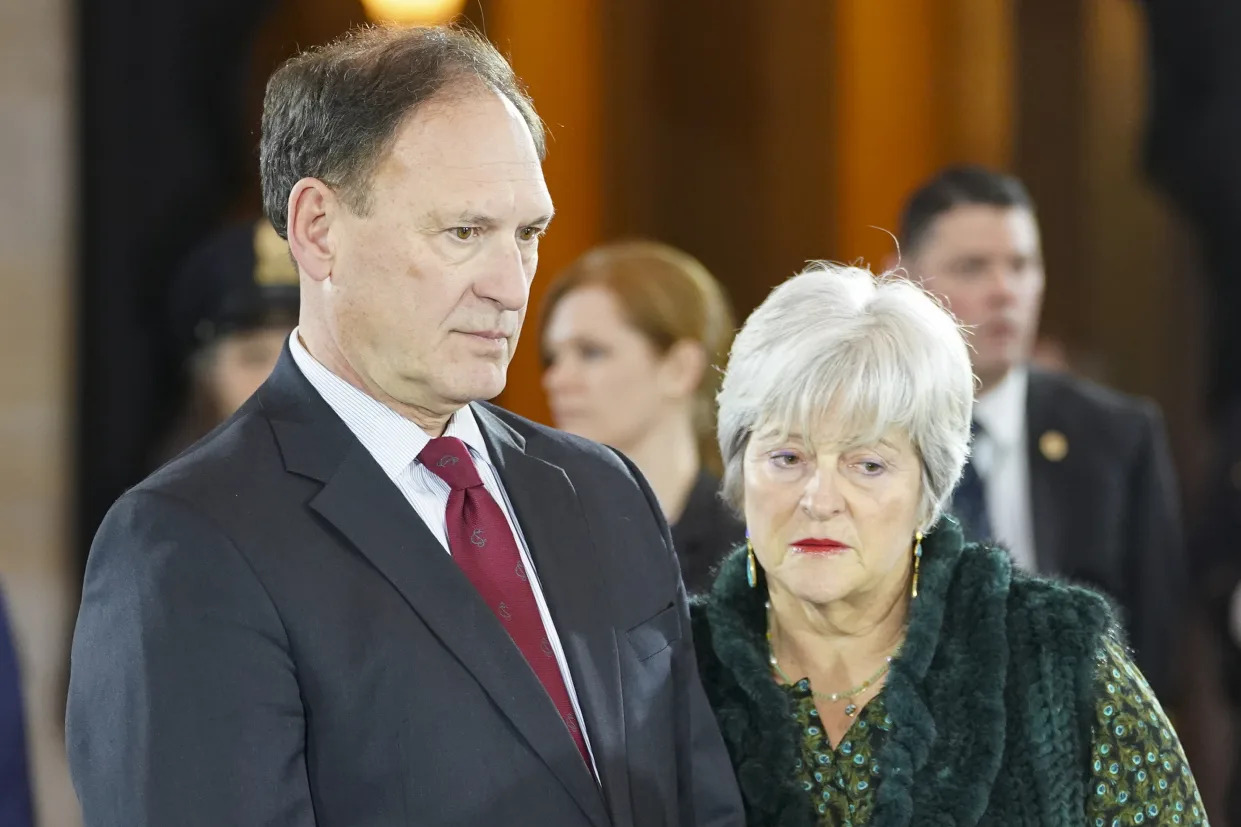
Lauren Windsor is not apologizing for recording her undercover conversations with Supreme Court Justice Samuel Alito, his wife Martha-Ann Alito and Chief Justice John Roberts.
In an interview with POLITICO Magazine, the progressive activist and documentarian discussed how and why she posed as a sympathetic anti-abortion activist to secure candid — and pugnacious — comments from Alito and his wife, including on the controversy surrounding the Alitos’ decision to fly politically-coded flags at their properties.
She said it was “shocking” to hear Martha-Ann Alito say she fantasized about designing a flag featuring the word “vergogna” — the Italian word for “shame” — to fly in response to LGBTQ+ pride flags. “I definitely did not see that coming,” she said.
Alito, meanwhile, raised eyebrows for his response to Windor’s question about the polarized state of American politics. “One side or the other is going to win,” Alito said on the recording. “There are differences on fundamental things that really can’t be compromised.”
Windsor also dismissed criticism from media ethicists who argue that she should have identified herself as a journalist and shouldn’t have secretly recorded the justices in 2023 and 2024.
“The Supreme Court is shrouded in secrecy, and they’ve really been dodging any accountability to the American public,” Windsor said. “Is it a bigger ethics problem for me to pretend like I’m a fangirl, or is it a bigger ethics problem for them to accept millions of dollars of undisclosed gifts from GOP donors?”
This conversation has been edited for length and clarity.
Were you surprised by Justice Alito’s response to your question about our polarized politics?
I was surprised that it was a departure from his response he gave to me in 2023. He was more forthcoming. Particularly at the Supreme Court level, judges exercise a very high degree of discretion, so I suspected that it would be very difficult to be able to get him to say anything newsworthy. I was really just trying to delve into whether he might give a different answer or if his thinking had evolved on it, given the level of media scrutiny he’s been under.
Why do you think he was more candid now? What could account for that change, in your mind?
It could very well be that he had the same belief when I talked to him in 2023 but he was just more guarded about it. That’s one option. It could be that he’s more aggrieved or has a bigger sense of grievance with the media, given everything over the past year. Maybe he felt like there’s a little bit greater trust since he had talked to me that one time before. It’s hard for me to say — I can’t see inside his mind.
Were you planning on going back to him to talk before the flag episode, or did you decide to do it after all the attention on the flags?
I had planned on going back regardless of the flag, but it certainly made it more interesting when the flags incident happened.
What are the logistics of these interviews? How do you get into the events, and then how do you actually get the recordings? Are you wearing a wire or something?
I’m not going to discuss methodology on any of this, but you buy a ticket. I registered, and I was a dues-paying member.
I think many of Alito’s critics have suspected for a while that his political biases are influencing his work on the court. Do you think your conversation with him revealed something about his thinking that his critics didn’t already suspect?
I think [some] people dismiss the story as, “Well, we already thought that this was happening — we already thought that his religious or political beliefs were influencing his decision, and this just confirmed that.”
It is something new, though, because it is a verbal confirmation of his lack of impartiality when deciding these cases. If you say there’s fundamental things that can’t be compromised, what are those things?
What did you make of that comment, as well as his comment that “one side is going to win”? It’s a little bit ambiguous what he’s saying, so I wonder how you understood it.
The reason that I chose to ask about polarization is that judges are very discreet, and if I had approached him asking about Democrats and Republicans, he probably would have shut down pretty quickly, right? But talking about polarization is really shorthand for political polarization, and that’s really bound up in the political conversation about religion. I feel like it’s kind of hard to separate out the religious from the political when talking about achieving “godliness” or “godly ends.”
He said at one point, “There are differences on fundamental things that can’t be compromised.” Do you agree with him that there are genuinely irreconciled views in the country, or do you think there is a path toward pluralism and peaceful coexistence at this point?
I believe in secular democracy. I don’t think that we should be legislating morality, and in order for that to happen, there has to be a separation of church and state. I think that is a fundamental value that we should not compromise. That’s a value that is bedrock to the founding of our nation.
Do you think that the type of reporting you do strengthens that barrier? Is it putting us on a path toward some sort of reconciliation, or is it just highlighting the contradictions that are already inherent in our political system?
I fear here that we are at a crossroads in this country of whether or not we want to remain a secular democracy or whether or not we want to become a Christian theocracy. And my reporting and my role is to expose public servants who will lead us down that path so that Americans are armed with the information they need to know to make decisions to hold those folks accountable.
Your conversation with Martha-Ann Alito was the most unusual of all your conversations. At one point in the conversation, Alito repeatedly meows at a woman named “Cat.” Were you expecting what you got from her?
In the audio, you can hear that I bring up my conversation with her husband, and I was definitely trying to get further evidence of bias in [his] decision making. Was this really her flag?
Let’s be honest here: He clearly knows that she has this affinity for these flags, and he let it go and let her do it anyway, even though it’s important to have an appearance of impartiality. I’m not going to let him off the hook as, “Oh, well, those are my wife’s flags. I had nothing to do with it.” He was clearly enabling that.
I didn’t expect a lot of the other color at all. I didn’t expect the story about Robin Givhan at the Washington Post [in which Alito tangled with the Pulitzer-winning fashion critic]. I didn’t expect her to meow several times.
The thing that was most shocking was probably the thing about the “vergogna” flag and how she said that fantasizing about making flags satisfies her. I definitely did not see that coming.
What did you make of that? What do you think she is trying to signal by saying she fantasizes about flying a flag that says “shame”?
I don’t understand what is so abhorrent to her — I mean, I do understand what’s abhorrent to her about the pride flag, but it’s other people expressing who they are, and it’s their First Amendment right. But it clearly deeply affects her, because she spends a lot of time thinking about it.
Justice Roberts pushed back against some of your provocations. Were you heartened by his response?
I was heartened by his response because I was like, “OK, you know, this is great — this is someone who is an old-school, rational jurist.” But as the chief justice and someone who’s widely regarded as an institutionalist, he’s going to have much more discretion. So given that he says these things but then he allows Justices Alito and [Clarence] Thomas to act in a more brazen manner without really enforcing the appearances of propriety on the court — he’s enabling that behavior, so I have to question his sincerity.
You also brought up the leak of the Dobbs decision with Justice Alito. Why did you want to ask him about that in particular?
It’s widely suspected that he’s the person who leaked the opinion, so I was trying to gauge his reaction. And he seemed uncomfortable. That could be for any variety of reasons, but I’m not sure exactly what he was going to tell me. It was more of trying to gauge his reaction.
He looked uncomfortable? What gave you that sense?
You can tell when someone’s not comfortable talking about a subject. You know — a little fidgety and kind of looking the other way. That was over a year ago, so it’s not crystal clear, but my impression was that he wasn’t comfortable with it. But that may have also been an aggressive line of questioning. I don’t want to impute things on him that I don’t have evidence for, but it was my impression was that he was not comfortable.
In the recordings, you kept swearing and dropping F-bombs and then apologizing profusely for them. Was that a tactic?
I was only doing that with Martha-Ann. Obviously it would have been very inappropriate with the justices, and it was borderline inappropriate with her, but it was a way to show that I really care about this and am very passionate about it and I’m just so angry about what they’re doing to [her]. I felt it was a way to commiserate with her that would be a little bit more believable.
I mean, it seemed to work.
You did get some meowing out of her.
You’ve got to realize, too, that it’s at the end of a dinner, and we’ve had a couple glasses of wine.
That gets the conversation flowing.
You know…
You’ve gotten some pushback for conducting these interviews undercover, without identifying yourself as a journalist. Why do you think it’s justified to take that approach?
The Supreme Court is shrouded in secrecy, and they’ve really been dodging any accountability to the American public. They’re not going to go out and talk about what they’re doing or why, so we can’t get the answers to anything.
Is it a bigger ethics problem for me to pretend like I’m a fangirl, or is it a bigger ethics problem for them to accept millions of dollars of undisclosed gifts from GOP donors? Obviously this is what I believe, but maybe the media and others — instead of pearl-clutching — should be trying to get more answers from the court and more accountability.
Is it sort of an eye-for-an-eye equivalency in your mind? Like if they’re lying to us, it’s OK for us to deceive them?
I am not a fan of an eye-for-an-eye on things. I am a fan of accountability. I think that people who are in positions of power — if they’re going to refuse to be held accountable, then it warrants taking measures that you might not otherwise take.
Do you worry that the justices will become even more reclusive and more unwilling to answer any sort of questions now that something like this has happened? Or do you think we’re past the point where those considerations matter?
I don’t know what the marginal difference there is. They’re already not answering anything.
Was it all worth it in your mind?
Yeah. I think we have got to force a conversation about what’s at stake on the Supreme Court. We have a court that is now made up of five religious extremists and jurists, and I don’t think the average American is quite aware of the impact that’s having on the court’s decisions and how that trickles down into their everyday lives. But they’re becoming more and more aware of it as rights are being stripped away and as women are losing reproductive rights. And it’s not just abortion. Is birth control on the table?
There are many, many ways in which the Supreme Court’s decisions impact Americans’ lives, and I think the more that journalists can expose the decision-making process that goes into that, the better.
What kind of political response would you like to see?
The appropriate political response is holding congressional investigations. Let’s get the evidence, and let’s hear what they have to say about these various breaches, and then take appropriate remedies as need be. I’m not going to say that so-and-so will be impeached, but there have to be consequences. I don’t think the founders ever intended for us to just have a rogue court that’s not accountable to the American public.
Do you think your reporting will persuade anyone who’s on the fence about the court’s impartiality? Or have people just made up their minds, and this just confirms one side’s view and entrenches the other?
The country is polarized, but people can change their mind with new information. I feel like I do my part when I give people more information. That’s really all I can do, is make sure that the information gets out in the world and then people can do what they want with it. But beyond that, I can only do what I can do.
Supreme Court Justice Alito talks polarization, his wife talks revenge in secret recordings
Dan Morrison and Sudiksha Kochi, USA TODAY
Updated Tue, June 11, 2024
WASHINGTON – Supreme Court Justice Samuel Alito and his wife were captured in secret recordings that featured the justice discussing the country’s left-right divide, while Martha-Ann Alito implied she would take revenge on media outlets that reported on controversial flags flown at Alito family homes.
“Look at me, look at me,” Martha-Ann Alito said. “I’m German, from Germany. My heritage is German. You come after me, I’m going to give it back to you.”
The recordings were made at a June 3 gala for the Supreme Court Historical Society by liberal activist Lauren Windsor and released Monday night.
“One side or the other is going to win,” Justice Alito said in one recording after Windsor, posing as a Catholic conservative, asked him leading questions about political polarization in America. “There can be a way of working, a way of living together peacefully, but it’s difficult, you know, because there are differences on fundamental things that really can’t be compromised.”
More: Chief Justice Roberts says he'll stay clear of Alito's Trump recusal refusal
Windsor also recorded Chief Justice John Roberts, who declined to take her bait.
“Would you want me to be in charge of putting the nation on a more moral path?” Roberts asked her at the $500-a-head gala. “That’s for people we elect. That’s not for lawyers.”
When Windsor replied that she believed “we live in a Christian nation and that our Supreme Court should be guiding us in that path,” Roberts quickly shot her down, saying, “I don’t know if that’s true.”
“I don’t know that we live in a Christian nation,” the chief justice said. “I know a lot of Jewish and Muslim friends who would say maybe not, and it’s not our job to do that.”
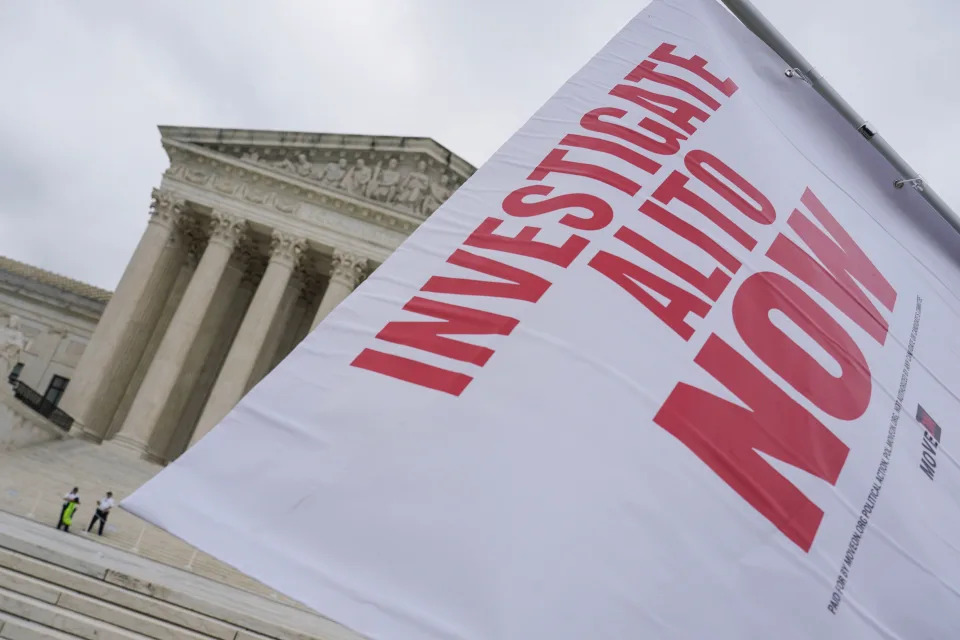
WASHINGTON, DC - JUNE 05: A flag is waved an event at the Supreme Court of the United States with MoveOn and progressive organizations whose members are demanding an investigation into Justice Alito on June 05, 2024 in Washington, DC.
Windsor defended secretly taping the justices.
"You know, the Supreme Court has been shrouded in secrecy, and they've dodged any accountability for what are − any reasonable person would consider − serious ethics violations or serious ethics problems, and I think that the American people deserve to have more information about that,” she told USA TODAY.
“Justice Alito is very ideological and that influences his opinions, right?" Windsor said. "But it takes on a different − you have a different understanding of things when you hear it from someone's own mouth that there's fundamental things that they can't compromise."
More: Amid blowback over Clarence Thomas travel, Supreme Court says it will adopt first-ever code of conduct
Windsor released the recordings at a fraught moment for the high court, after Alito and his wife were criticized for flying flags from their homes in Virginia and New Jersey that experts say are closely linked to the Stop the Steal election denial movement and the Jan. 6 Capitol riot.
Critics including Sen. Dick Durbin, D-Ill., chair of the Senate Judiciary Committee, called on Alito to recuse himself from Supreme Court cases involving former President Donald Trump’s broad claims of immunity in his federal election interference indictment and separate case over a law used to charge Trump and scores of Jan. 6 defendants.
Alito refused and said in a letter to the committee that his wife had raised the flags without his knowledge.
More: Mike Pence was a Jan. 6 target. He says criticizing Alito's flag is 'absurd'
Approaching Martha-Ann Alito at the June 3 benefit, Windsor expressed sympathy for the criticism she and her husband had been experiencing. Martha-Ann Alito broke in: “It’s OK! It’s OK!”
“It’s OK because if they come back to me, I’ll get them ... The media.”
Last month it was reported that an upside-down American flag had flown outside the Alitos' Virginia home after Trump's defeat in the 2020 election. The inverted flag has become a symbol for some Trump supporters who, like the former president, continue to claim the election was stolen.
Last summer, an "Appeal to Heaven" flag was raised outside the couple's New Jersey beach house. The Revolutionary War-era flag has become a potent symbol for "Stop the Steal" activists and Christian identity movement.
“You know what I want?” Martha-Ann Alito told Windsor. “I want a Sacred Heart of Jesus flag because I have to look across the lagoon at the Pride flag for the next month.”
A spokesperson for the court didn't immediately return a call for comment.
This article originally appeared on USA TODAY: Alito, wife caught talking about political compromise on secret audio
Secret recordings of Justice Alito and wife Martha-Ann come on heels of flag controversy. A look at the recent Supreme Court issues.
Kate Murphy
·Producer
Tue, June 11, 2024
Supreme Court Justice Samuel Alito and his wife, Martha-Ann Alito, at the U.S. Capitol Building in Washington on Feb. 28, 2018. (Pablo Martinez Monsivais/AP)
Supreme Court Justice Samuel Alito is facing renewed scrutiny after a secret recording captured him speaking candidly about how compromise between the political left and right might be impossible. Alito was also heard agreeing with the woman who surreptitiously recorded him that America should return “to a place of godliness.”
In another secret recording, Alito’s wife, Martha-Ann, can be heard complaining about having to look at a Pride flag being flown in her neighborhood. It’s the latest bout of controversy surrounding the Alitos after they came under fire recently for flying flags associated with efforts to overturn the 2020 election at their homes.
The secret recordings of the Alitos are the latest in a series of recent incidents involving Supreme Court justices and their families.
Here’s what happened with the recordings and why it matters:
🎙️ The secret recordings
The secretly taped audio of the Alitos released on Monday was recorded by an advocacy filmmaker, Lauren Windsor, who said she posed as a religious conservative ally when speaking with them at the Supreme Court Historical Society’s annual dinner last week. (The Alitos were unaware they were being recorded, though Windsor was legally allowed to do so in Washington, D.C., as long as one party consented to the recording.)
Windsor asked Alito his thoughts on whether the polarization of the left and right will end, or if it boils down to one side winning. Alito can be heard saying to Windsor, “One side or the other is going to win. [...] There can be a way of working, a way of living together peacefully, but it’s difficult, you know, because there are differences on fundamental things that really can’t be compromised.”
Windsor then spoke to Alito about matters of morality, saying, “I think that the solution really is like winning the moral argument. Like, people in this country who believe in God have got to keep fighting for that, to return our country to a place of godliness.”
“I agree with you,” Alito responded.
🏳️🌈 Another Alito flag controversy
Windsor also posed as a conservative supporter when she secretly recorded Alito’s wife at the same event.
“You know what I want?” Martha-Ann can be heard asking Windsor. “I want a Sacred Heart of Jesus flag because I have to look across the lagoon at the Pride flag for the next month.” Martha-Ann then described her husband’s reaction: “He’s like: ‘Oh, please, don’t put up a flag.’”
Martha-Ann agreed that she wouldn’t put up the flag for now, but vowed that when her husband was “free of this nonsense” that she would put it up “to send them a message every day, maybe every week. I’ll be changing the flags.”
Martha-Ann’s secretly recorded comments to Windsor come after two different reports that controversial flags were flown at two of the Alitos’ homes in recent years.
One instance was in the weeks following the 2020 presidential election when an upside-down American flag was flown outside their Virginia home. The upside-down flag is a longtime symbol used in dire distress and was adopted by supporters of former President Donald Trump when he challenged President Biden’s victory in 2020.
Another instance was last summer, when an “Appeal to Heaven” flag appeared outside the Alitos’ New Jersey summer home, another flag that has become associated with Trump's efforts to overturn the 2020 election results.
Alito insisted he was not familiar with the flag connotations, saying in a May 2024 letter to Congress, “My wife is fond of flying flags. I am not.” Alito added that he didn’t have anything to do with either of the flag incidents and said Martha-Ann “makes her own decisions, and I have always respected her right to do so."
🏛️ Other recent SCOTUS controversies
The incident marked the latest public controversy involving a Supreme Court justice or family member. Some other recent events include:
Last week Justice Clarence Thomas disclosed free luxury trips he had not previously reported; an advocacy group estimates he has received nearly $4.2 million in gifts over the course of 20 years.
Alito also faced scrutiny in 2023 for accepting gifts, including a fishing trip with a person who later had business before the Supreme Court, according to ProPublica.
Thomas’s wife, Ginni Thomas, sent texts to Donald Trump’s White House chief of staff Mark Meadows as Trump contested the 2020 election. It came as her husband was also hearing SCOTUS cases related to the 2020 election.
⚖️ Why it matters
The Supreme Court justices determine some of the most consequential cases that affect the laws and policies of the entire nation. Under the Supreme Court’s non-enforceable 2023 code of conduct: “A Justice should not allow family, social, political, financial, or other relationships to influence official conduct or judgment.” It also says: “A justice should perform the duties of office fairly, impartially, and diligently” and “refrain from political activity.”
The Supreme Court justices aren’t held accountable by any methods, other than impeachment, and they can decide which cases to recuse themselves from.
The secret recordings of Alito matter because Democrats have previously questioned the justice’s political impartiality, calling on him to recuse himself from two high-profile SCOTUS cases related to Jan. 6: One that will affect former President Trump’s Jan. 6 criminal case, and one regarding charges against Jan. 6 defendants. Despite the controversies coming to light, Alito has declined to recuse himself from both of these cases.












